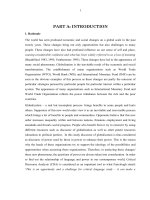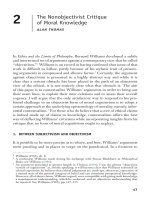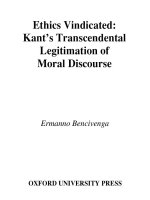- Trang chủ >>
- Khoa Học Tự Nhiên >>
- Vật lý
ethics vindicated kants transcendental legitimation of moral discourse nov 2006
Bạn đang xem bản rút gọn của tài liệu. Xem và tải ngay bản đầy đủ của tài liệu tại đây (1.12 MB, 208 trang )
Ethics Vindicated:
Kant’s Transcendental
Legitimation of
Moral Discourse
Ermanno Bencivenga
OXFORD UNIVERSITY PRESS
Ethics Vindicated
_
_
_
This page intentionally left blank
Ethics Vindicated
Kant’s Transcendental Legitimation
of Moral Discourse
Ermanno Bencivenga
1
2007
_
_
_
3
Oxford University Press, Inc., publishes works that further
Oxford University’s objective of excellence
in research, scholarship, and education.
Oxford New York
Auckland Cape Town Dar es Salaam Hong Kong Karachi
Kuala Lumpur Madrid Melbourne Mexico City Nairobi
New Delhi Shanghai Taipei Toronto
With offices in
Argentina Austria Brazil Chile Czech Republic France Greece
Guatemala Hungary Italy Japan Poland Portugal Singapore
South Korea Switzerland Thailand Turkey Ukraine Vietnam
Copyright # 2007 by Oxford University Press, Inc.
Published by Oxford University Press, Inc.
198 Madison Avenue, New York, New York 10016
www.oup.com
Oxford is a registered trademark of Oxford University Press
All rights reserved. No part of this publication may be reproduced,
stored in a retrieval system, or transmitted, in any form or by any means,
electronic, mechanical, photocopying, recording, or otherwise,
without the prior permission of Oxford University Press.
Library of Congress Cataloging-in-Publication Data
Bencivenga, Ermanno, 1950–
Ethics vindicated : Kant’s transcendental legitimation of
moral discourse / Ermanno Bencivenga.
p. cm.
Includes bibliographical references and index.
ISBN-13: 978-0-19-530735-1 (cloth : alk. paper)
ISBN-10: 0-19-530735-6 (cloth : alk. paper)
1. Kant, Immanuel, 1724–1804—Ethics. 2. Ethics, Modern—18th century.
3. Liberty—History—18th century. I. Title.
B2799.E8B37 2006
170.92—dc22 2006040058
135798642
Printed in the United States of America
on acid-free paper
[T]he Critique of Pure Reason might well be the true apology
for Leibniz, even against those of his disciples who heap
praises upon him that do him no honor; as it may also be for
sundry older philosophers, whom many an historian of
philosophy—for all the praise he bestows on them—still has
talking utter nonsense; whose intention he does not divine,
in that he neglects the key to all accounts of what pure reason
produces from mere concepts, the critique of reason itself (as
the common source of all them), and in examining the
words they spoke, cannot see w hat they had wanted to say.
(TA336 VIII 250–51)
_
_
_
This page intentionally left blank
preface
Decades ago, as a young man, I entered Kant’s conceptual territory. It
was not easy, since there are no roads or pathways leading you there;
you can only hope that somehow, magically, the duck will turn into a
rabbit and everything will start looking different. I remember re-
peating to myself, like a mantra, ‘‘This table is only a representation’’
and ‘‘This representation is of a table,’’ painfully trying to acquire a
perspective from which both those statements would be true, and
being frustrated when, as the perspective seemed to be at hand, any
disturbing occurrence in the environment, however minimal, would
immediately reconstitute, just because of its disturbing character, the
point of view I was naturally familiar with. Nor were matters resolved
when the Kantian point of view became itself more familiar, since at
the end of the day I had to leave my transcendental ruminations and
take care of ordinary objects and tasks in ordinary surroundings, in my
ordinary empirical mode; thus my life became a perpetual shifting
between incompatible views and, as strongly as I had come to believe
that it was so much better that way, this belief did not make things any
easier.
Kant’s Copernican Revolution was my first report on what this life
form is like—the revolutionary outlook and the constant oscillation
between revolution and conformism. It could not be a report based
on Kant only, of course: you do not face the most original, deep,
and thorough mind of the Wes tern tradition alone, or you would be
swallowed whole and then spat back as a pathetic clone of the great
_
_
_
man, reduced to parroting his language without understanding any of
it. You need formidable intellectual tools to resist Kant and struggle
with him; so that earlier book needed a lot of logic and metaphys-
ics and epistemology, of metamat hematics and set theory, of Plato
and Aristotle and Descartes and Frege and Russell and Carnap—and
Wittgenstein, naturally. Still, it was only a beginning; the real chal-
lenge here is the ethics, because no word Kant ever wrote is irrel-
evant to it, and because even the step from transcendental realism to
transcendental idealism, epochal as it is, pales in comparison with the
monstrous complications of thinking through freedom and responsi-
bility, good and evil, respect and authority. This thinking through has
required some twenty years: my dialogue on freedom and my article
‘‘The Metaphysical Structure of Kant’s Moral Philosophy,’’ which
contained the essence of the story I wanted to tell, were both pub-
lished in 1991, but then there would be passages in the corpus that
would throw the project into disarray, and me into a condition of
despair. Eventually, to make sense of them I had to address the very
notion of making sense, and to bring out some of the most surpris-
ing and exciting consequences of Kant’s revolution; but, again, that
took time. And it took more and more tools: psychology and decision
theory, history and politics, and more Plato and Aristotle as well as
Bentham and Mill and Moore and Nietzsche and Rawls and Hei-
degger and Arendt and Levinas and Sartre. And, foremost, Hegel, to
develop a clear sense of how thing s could look instead: of how far
they could go wrong.
What I have come up with is a book of my maturity: a time of
reflection and judgment, when one inevitably tries to appreciate the
significance of one’s life—among other things: what it means to be
human, to behave rational ly, to attempt to display goodness. Which
brings me to the second point I want to make in this preface. Through
most of my career, I have found myself writing two books at once,
one in English and one in my native Italian; and it was intriguing to
regularly find suggestive resonances between them, though their top-
ics were often quite different. The present situation is a case in point,
since at the time I was working on this book I was also writing in
Italian about my conception and experience of America, and that
amounted to a weighing and evaluating of a quarter century of con-
fused and confusing occurrences, in both my own life and the life
of this nation, and proved to be very much attuned to that other
project of weighing and evaluating the towering figure of my in-
tellectual life.
viii preface
In one sense the resonance is obvious, because in the Italian book
I talk about the America I value and cherish as a Kantian idea of
reason, one in which humans are autonomous originators of their
own destinies, and responsible for them, as opposed to delegating such
responsibility to tradition or family or society or whatever. In another,
slightly less obvious, sense the resonance is, however, even more im-
portant for me, since I have been arguing that the best representatives
of the America I value and cherish are immigrants, people who have
chosen this place, who have overcome a large part of their thrownness
by taking their lives in their own hands, and of course America is a
land of immigrants, and of course I am one of them. Ultimately, it is
not essential that I was an immigrant here, because it is the very
condition of being an immigrant that matters to me, in precisely the
same way in which the Copernican revolution does: because an im-
migrant is always a person of two worlds, who cannot sit comfortably
in either, who develops a critical attitude on both of them because of
how much she can see missing there that others, perfectly at home
in it, are not in a position to see. Just as with Kant: ideas are unreal
abstractions, and yet real objects, the only objects there are, are but
appearances—there is no safe, reassuring place anywhere. I would not
want to have it any other way; but, then, I must recognize that others
will feel differently. Kant, and America, are not for everyone, wher-
ever they might be born.
This intricate nesting of personal and intellectual issues should
make it clear, finally , that Kant, for me, is much more than a pro-
fessional interest. He is, like any philosopher I ever cared about but
more intensely than any other , a role model, a person of a kind I
would like to be , an archetype of humanity. I have not met many of
those. My wife and I spent a glorious afternoon with Konrad Lorenz,
at his house in Altenberg; I have had a few times the privilege of ad-
miring Noam Chomsky’s brilliance; I once had lunch, all too briefly,
with Norman Brown (I kept telling him about contemporary Italian
philosophy—what little there is of it—and he kept asking me ‘‘But
what about the politics?’’). I have missed Marcuse and Sartre, and
David Boh m. There isn’t much else out there, you know. So, would
I have wanted to be a guest in Ko
¨
nigsberg once, maybe even be at
dinner there? You bet: as everyone who is in this condition of awe,
I feel very close to the object of my admiration; I feel (however
delusively) as if I have a sense of the simplicity of his courage, the
earnestness of his effort, the warmth of his humor, the supreme dig-
nity of his conception of humans. So I would certainly have loved to
_
_
_
preface ix
sit in his wake and see my hero perform as I expected him to; but then
I must ask myself, in a Kantian vein, if that satisfaction of a natural
drive, whatever the pleasure derived from it, would have been for the
better, and I must be skeptical of it. No confirmation of the truth of
my interpret ation could come ‘‘from the horse’s mouth,’’ Kant has
taught me; what any interpretation must do is confront the same texts,
scattered as many of them were by bloody wars and countless other
vicissitudes. Any interpretation must take up these texts and become
responsible for an autonomous reading of them. What reading I have
to offer will say a lot about Kant, I hope; but, however that goes, I
know it will say a lot about me.
x preface
contents
Note on Texts xiii
Chapter 1. Problems for Ethics 3
Chapter 2. The Framework 6
1. Transcendental Philosophy 6
2. Transcendental Idealism 13
3. Appearances 16
4. Apperception 20
Chapter 3. Freedom 23
1. Overdetermination 23
2. Autonomy 29
3. Rationality 34
4. (Un)intelligible Mysteries 43
5. Relentless Criticism 49
Chapter 4. Values 57
1. A Spectator 57
2. Evil 62
3. Responsibility 68
4. The Geography of (Non)sense 76
Chapter 5. Imperatives 85
1. Laws for Imperfect Beings 85
2. Virtue and Goodness 96
3. The Dynamics of Hope 101
_
_
_
Chapter 6. Ordinary Morality 111
1. Analytic and Synthetic Methods 111
2. The Problems Resolved 113
3. Philosophy and Freedom 115
Notes 123
Index 191
xii contents
note on texts
Most Kant quotes are from the Cambridge Edition of the Works of
Immanuel Kant. The following abbreviations are used for volumes of
this edition and for individual works within some of those volumes:
C: Correspondence
J: Critique of the Power of Judgment
LE: Lectures on Ethics
LL: Lectures on Logic
LM: Lectures on Metaphysics
N: Notes and Fragments
O: Opus Postumum
P: Practical Philosophy
G: Groundwork of the Metaphysics
of Morals
PR: Critique of Practical Reason
M: Metaphysics of Morals
R: Religion and Rati onal
Theology
RR: Religion within the Boundaries
of Mere Reason
TA: Theoretical Philosophy after
1781
TB: Theoretical Philosophy 1755–
1770
For Kant works not yet included in the published volumes of the
Cambridge edition, I have used the following texts (and abbreviations):
AP: Anthropology from a Pragmatic Point of View. Translated by V.
Dowdell. Carbondale: Southern Illinois University Press, 1978.
E: Education. Translated by A. Churton. Ann Arbor:
University of Michigan Press, 1960.
PW: Political Writings. Edited by H. Reiss. Translated by H. Nisbet.
Cambridge: Cambridge University Press, 1991.
_
_
_
xiii
References to the first Critique are given by indicating the A/B
number(s); for one note in Kant’s own copy of the first edition I have
given the A number followed by the volume and page number of the
Akademie edition of the Gesammelte Schriften. Most other references
include the volume (or individual work) and page number(s) of the
translation and (when applicable) the volume and page number(s) of
the Akademie edition. Thus, a typical reference would be M548 VI
424, to be read: page 548 of the Cambridge translation of the Meta-
physics of Morals, corresponding to page 424 of volume VI of the
Akademie edition. One reference includes only the volume and page
number of the Akademie edition. I have uniformed all translations
to American spelling, I have never italicized ‘‘a priori,’’ I have never
capitalized ‘‘idea,’’ and I have always used italics when a translation
uses boldf ace or small capitals. Square brackets are sometimes the
translators’ and sometimes my own; braces are always the translators’.
The only other works cited are the following:
Bencivenga, Ermanno. Kant’s Copernican Revolution. New York:
Oxford University Press, 1987.
—
. Free From What? Erkenntnis 33 (1990): 9–21.
—
. La liberta
`
: un dialogo. Milano: Il Saggiatore, 1991. English
translation Freedom: A Dialogue. Indianapolis: Hackett, 1997.
—
. The Metaphysical Structure of Kant’s Moral Philosophy.
Philosophical Topics 19 (1991): 17–29.
—
. Kant’s Sadism. Philosophy and Literature 20 (1996): 39– 46.
—
. Hegel’s Dialectical Logic. New York: Oxford University Press,
2000.
Euclid. The Thirteen Books of the Elements. Translated with
introduction and commentary by Sir Thomas L. Heath. New
York: Dover, 1966.
Hume, David. A Treatise of Human Nature, 2nd edition. Oxford:
Oxford University Press, 1978.
Strawson, P. F. The Bounds of Sense. London: Methuen, 1966.
xiv note on texts
Ethics Vindicated
_
_
_
This page intentionally left blank
one
C
c
problems for ethics
C
c
The alleged subject matter of ethics is human conduct. Not
human behavior; not everything humans do. But, specifically,
what they do of their own choice, because they want to do it; what they
do freely. And here ethics faces a first monumental problem: its alleged
subject matter runs the risk of vanishing into thin air, of turn ing out to
be purely delusional.
1
For humans are natural beings, hence what they
do, everything they do, is as much a necessary consequence of preceding
events and conditions as the ‘‘behavior’’ of oceans and avalanches; and,
one necessary step after (or rather, before) another, it is a consequence
of events and conditions well beyond the scopes of their lives.
2
That
I ‘‘chose’’ to write this book is a consequence of moves my parents
made, and their parents, and their parents’ parents, long before I ever
came into the picture. Of course, I wanted to write it, but how much
of a causal factor is that? That I want to do something, too, follows
from things other people did and I could not have wanted to see done
(since I was not there); hence, it cannot be a manifestation of my
freedom. Thus, human conduct is nonexistent, indeed inconceivable;
and ethics is left with nothing to deal with. Nor is the occurrence of
indeterministic events (as, say, quantum mechanics sanctions it) going
to provide any relief here; even if we are willing to admit that some-
thing A might happen as the result of pure chance, it would make no
sense to claim that A is totally random and also the outcome of an
individual’s free choice.
3
_
_
_
3
But assume that we successfully meet the monumental challenge
above: that somehow we find room for genuine human actions—
where an action is the unit of (human) conduct. Immediately we en-
counter another threat that is just as deadly. For what ethics is supposed
to do with its subject matter is judge it, evaluate it, assess it on the basis
of its own standards. If I do something freely, ethics will not content
itself with relating it to other things I or others did equally freely, or
with elaborating a taxonomy of what I or others typically choose to
do, or even with bringing out how far I or others in fact (freely)
approve of what I have done. Any such pursuit would belong to an
empirical discipline like psychology, or sociology, or statistics; and
ethics is no empirical discipline. Its concern is not with understanding
what anyone does, but with determining how good it is: not good for
someone, or for some purpose or other, but good, period, un-
conditionally good, good in a totally absolute sense—one that is in-
dependent of what happens and might well be in conflict with all that
happens. How is this kind of judgment legitimate? How is it more
than the expression of individual preferences? What is the place of
values in a world of facts?
And it is not over. Aesthetics, too, is regarded by many as an eva-
luative discipline, and as one that might be based on equally ambitious
(and unrealistic) expectations. Landscapes, people, and works of art are
often assessed by comparing them with standards of beauty which, we
might imagine, nothing fits perfectly, with ideals that everything falls
short of. And we might occasionally feel nostalgic for such ideals, and
desperately long for their realization; but it is unlikely we would go any
further. Ethics, on the other hand, does not only evaluate conduct; it
also prescribes it—when it regards something as good, it also judges it
necessary that people do it. However beyond our resources good con-
duct might be, that is precisely what ethics imposes on us: what it says
we ought to bring about. Ethics is a normative discipline, in a much
stronger sense than any other. It is often claimed that scientific theories
are normative because the world they ‘‘describe’’ is highly idealized:
much more simple and elegant than the real world ever is. And yet, we
do not ordinarily think that an astronomical theory tells the universe
what to do, or that a sociological theory does that with communities,
crowds, or institutions. Ethics, on the other hand, tells us—each of us—
what to do; which makes its status, once again, uncertain (what kind of
‘‘discipline’’ is this, that pretends to shape what it applies to? does it
amount to mere wishful thinking?) and leaves it totally mysterious
where the authority that does the prescribing is to issue from. We are
4 ethics vindicated
familiar with officers prescribing behavior to their subordinates, and
with laws doing so in a state; in all such cases, we can think that the
prescribing is authoritative because of the (physical or political) power
the prescriptive agencies have. But what kind of power makes ethical
injunctions authoritative? What sense does it make for ethics to claim,
as it often does, that, unless they are consistent with its injunctions, even
the officers’ or the laws’ commands carry no weight, have no real
authority?
Ethics has more specific, local problems than the three I men-
tioned. As with any other human endeavor, its practitioners disagree
in subtle and important ways on the details of their positions and
arguments. But those three problems are its most basic ones, in the
literal sense that, unless they are resolved in a positive w ay, ethics has
no base at all. They are the preliminary to the entertaining of any
substantive ethical views, the conditio sine qua non for the very legiti-
macy of moral discourse. Immanuel Kant’s philosophy, as I see it, is
a sustained, bold, and successful effort aiming at such resolut ion. In
order to reach its goal, it is forced to many digressions, some of them
enormously long and complex, and of enormous independent inter-
est. But we do not want to miss the forest for the trees, because there
is something of great consequen ce at stake.
4
The challenges to the
credibility of ethics that Kant was facing in the eighteenth century had
been raised before, in different languages using different metaphors,
and are still being raised, in yet newer jargons; Kant himself would
say, indeed, that there is no escaping their constant recurrence. They
are an essential component of our form of life: of the irremediably
conflictual existence we lead. But it is just as essential to our life that
they be answered, and that the answer be loud and clear. The point of
this book is to spell out Kant’s answer,
5
in a language that speaks to
our times, so as to, once again, patiently, attend to the interminable,
unavoidable task of establishing the dignity and autonomy of our
moral standards.
_
_
_
problems for ethics 5
two
C
c
the framework
C
c
In this chapter, I summarize the fundamental theses and results of
my Kant’s Copernican Revolution that are relevant to what follows.
I do not argue for them, either textually or theoretically, since I intend
to limit the amount of repetition to a minimum.
1
But I think that a
brief summary is useful, as providing the basic presuppositions of my
understanding of Kant’s moral philosophy—the map within which this
understanding is to be located, as it were.
1. Transcendental Philosophy
Most of Kant’s predecessors thought that philosophy could and did
establish factual truths; for example, that it could and did establish that
God exists, or that the soul is immortal, or that the world is infinite (or
finite). As established philosophically, such truths were proved by a
priori arguments; hence in fact (one thought) more than their factual
truth was proved. They were proved to be necessary; and that they
were true was then supposed to follow as a trivial consequence.
2
Thus
Anselm’s and Descartes’s ontological arguments proved that God must
exist, that He cannot but exist, that His nonexistence is inconceivable;
from which it was only (it seemed) a small step to conclude that He
does exist.
Kant’s transcendental philosophy, on the other hand, has no factual
import whatsoever. It gives no information about the real world where
6
we lead our ordina ry, everyday life; it cannot add (or detract) anything
to (or from) it. The existence and natu re of what belongs to the real
world is decided by our ordinary experience, inclusive of our empiri cal
sciences. The philosopher is to receive this material and not to chal-
lenge it in any way.
3
His task is rather to understand it, to explain how
it is possible.
4
More precisely: to provide a conceptual scheme, or logical
space, within which the terms used in describing ordinary experience
are given definitions generally consistent with that use.
5
It is not for
philosophy to decide that, say, we know midsize objects like tables,
chairs, and trees; that we do is part of life, and what particular expe-
riences of tables, chairs, or trees count as cognitive is dec ided by or-
dinary people in ordinary epistemic contexts, by using their ordinary
empirical criteria.
6
But philosophy needs to so determine what objects
and knowledge are as to make it possible for us to sometimes know
these objects—as to make sense of the claim that we sometimes do (and
that the empirical criteria will sometimes attain their intended goal).
7
It
is a scandal, Kant thinks, when philosophy cannot account for such
claims and is forced to conclude (say) that we are not just empirically
wrong in believing we know this or that, but conceptually wrong in
believing we can know anything at all—or in believing we can know
midsize objects, as opposed to the contents of our own minds.
The real world contains objects and events, and the most important
relation among them is causality: how an event brings about another
event, how the existence or the behavior of an object determines the
existence or the behavior of another one. The logical space contains
concepts, and the most important relation among them (as indeed was
suggested above) is definition: how a concept is articulated in terms of
other concepts, how an understanding of the former is provided in
terms of (an understanding of) the latter. So the logical space is like a
dictionary, where the concept of an oak is defined in terms of that of a
tree, and the concept of an acorn is defined in terms of those of an oak
and a fruit.
8
And the crucial demand to be put on this particular dic-
tionary—it is worth repeating—is that its definitions be serviceable in
our ordinary dealings, that they do not make it impossible for us to
operate with them in ways that fit our general expectations. If I were
to define an experience as cognitive, say, when it is particularly vivid,
that would contradict my general expectation that many dreams are
going to be much more vivid than most waking experiences while not
being cognitive (whereas some of those experiences are).
To put it in yet another way, the logic al space is like one of those
computer programs that help you organize your finances. Whether
_
_
_
the framework 7
you are rich or you are broke is not for the program to decide: that is
decided by the empirical data of your assets and liabilities. But it is a
condition of the program working properly that its instructions make
consistent room for the empirical data: that by following them you do
not find yourself running in circles, or gett ing contradictory out-
comes, or being entirely mystified as to where a given asset or liability
is supposed to be listed—or whether it is to be listed anywhere.
In Kant’s own terms, transcendental philosophy is—like all phi-
losophy, that is, all ‘‘cognition from concepts’’ (A837 B865)
9
—entirely
constituted of analytic judgments (since ‘‘from concepts no synthetic
propositions can be derived,’’ N278 XVIII 298). Because this claim
seems to contradict some of Kant’s own statemen ts,
10
and certainly
does contradict a substantial amount of Kantian lore, it will be useful to
articulate it further, with specific regard to the ethical works. Take the
Groundwork, then, where we are told: ‘‘That [the principle of au-
tonomy] is an imperative, that is, that the will of every rational being
is necessarily bound to it as a condition, cannot be proved by mere
analysis of the concepts to be found in it, because it is a synthetic
proposition; one would have to go beyond cognition of objects to a
critique of the subject, that is, of pure practical reason, since this
synthetic proposition, which commands apodictically, must be capable
of being cognized completely a priori’’ (G89 IV 440). Leaving aside
details to be discussed later, the general structure of the situation seems
clear: Kant is concerned with a proposition of great significance for
him, and one that he explicitly designates as synthetic. Fair enough.
The whole issue, however, revolves around what it means for him to
be concerned with it.
An earlier statement puts us on the right track: ‘‘[the] categorical
imperative or law of morality is an a priori synthetic practical
proposition; and since it is so difficult to see the possibility of this kind
of proposition in theoretical cognition, it can be readily gathered that
the difficulty will be no less in practical cognition’’ (G72 IV 420; italics
added). And later he insists: ‘‘How such a synthetic practical proposition is
possible a priori and why it is necessar y is a problem whose solution
does not lie within the bounds of the metaphysics of morals’’ (G93 IV
444). So Kant has a problem, and the best way to understand exactly
what that problem is will be to look at how he resolves it: ‘‘categorical
imperatives are possible by this: that the idea of freedom makes me a
member of an intelligible world and consequently, if I were only this,
all my actions would always be in conformity with the autonomy of
the will; but since at the same time I intuit myself as a member of the
8 ethics vindicated
world of sense, they ought to be in conformity with it; and this cate-
gorical ought represents a synthetic proposition a priori, since to my
will affected by sensible desires there is added the idea of the same will
but belonging to the world of the understanding’’ (G100–1 IV 454).
As we will see, the categorical imperative is independent of experi-
ence, hence a priori; and I have no difficulty accepting the claim that
it is synthetic. What Kant is arguing here, however, is not that this
imperative applies, but that it can apply. The argumen t he offers would
have no hope of establishing the former, since the intelligible world
he invokes to prove his point (whatever his point might be) is one
about which (again, as will be detailed later) he must admit we have
no knowledge. Therefore, Kant cannot even be attempting to prove
the categorical imperative itself; what he is after is a modalized version
of it, in which it is preceded by a possibility operator.
11
More pre-
cisely, since an imperative expresses the necessity of a certain kind of
behavior, the characteristic modality, here as in a number of other
crucial cases in Kant, is à
&&
&&
: possibly necessary.
12
It is possible that space
must be three-dimensional; it is possible that every event must have a
cause;
13
it is possible that one must act with total disregard for one’s
idiosyncratic makeup and situation. And this modalized version, as I
pointed out in Kant’s Copernican Revolution, is (with a qualification to
be made in the next paragraph) well inside the scope of (analytic)
cognition from concepts.
14
And now for the troubling news. A conseq uence of Kant’s char-
acterization of (transcendental) philosophy is that the latter is not a
cognitive enterprise: no knowledge can issue from it. Not in his view,
at least, since for him a cognition (Erkenntnis—the unit of knowl-
edge)
15
entails the interaction of concepts (or general repr esentations—
that is, representations that could in principle apply to more than
one thing, though of course some in fact apply to only one thing or to
none at all) and intuitions (or singular representations—constitutionally
directed to a single thing); but intuitions do not enter in that re-
connaissance of logical space transcendental philosophy consists of—
though of course the concept of an intuition does. (Transcendental)
philosophy can only establish logical possibility: it can prove that the
description of something, as far as we can tell, is not incoherent. This
proof, however, is a function of how detailed the description is and of
how deeply we went into the analysis of the terms involved in it—or in
what direction: Russell’s paradox was close to the surface of Frege’s set
theory, except that Frege had chosen to look (very intently, and in
great depth) away from it.
16
Real possibility, on the other hand (or
_
_
_
the framework 9
possibility, period: what is more than an appearance of possibility), re-
quires access to a real (singular) example of what we are talking about
(to a corresponding intuition), and no such example is forthcoming
within the transcendental (that is, conceptual) reflection where tran-
scendental philosophy is developed.
17
Talk of examples does; but this
talk is incapable of establishing its own consistency, however consistent
it might sound.
18
In critiquing itself, reason discovers its limits; rational
discourse is inspir ing and edifying but incapable of proving the ve-
ridicality of its tenets. Which is not all bad, as these limits ‘‘make room
for faith’’ (Bxxx); that is, allow for a more nuanced and accurate un-
derstanding of the complexity of our form of life.
Three remarks are in order before moving on. First, admittedly, the
radical distinction implied here between ordinary concerns and phil-
osophical activity seems artificial: ordinary people make constant use of
conceptual tools, even complex ones, and some have argued that what
tools those are determines what world they live in (Eskimos live in a
world in which there is no such thing as just snow, and so forth).
19
The
very notion of an ordinary person, one might insist, is a philosophical
abstraction. Which is a point well taken—except that it does not de-
tract from the substance of Kant’s position but only from its superficial
rhetoric. Changing some of the rhetoric but none of the substance, we
could then say: It is a scandal that our experience, inclusive of our
various attempts at making rational sense of it, should invariably make
so little sense; and what causes the scandal is one constant feature of
those attempts. They present themselves as final and all-inclusive: that
reason of our s which relentlessl y motivates their recurrence cannot
help thinking of itself as self-standing and self-contained, as in need of
nothing external for a full resolution of its problems.
20
But such in not
the case: our reason is sharply limited precisely in how it can satisfy its
own demands, which is revealed in an obvious way by the poor
cognitive status of its pronouncements and in a less obvious but ulti-
mately equivalent way by its necessity to always defer to an other—to
the nonrational or nonphilosophical as such; to what it itself must
characterize as nonrational and nonph ilosophical—as a source of the
wisdom it is forever (and forever unsuccessfully) looking for.
21
As we
will see, this conclusion has no negative impact on reason’s ambition
or on its nobility—the latter is indeed thought to be even higher here
because of reason’s failure to attain its ambitious goal (because of its
faithfulness to its standards, hence to its vocation, in the face of such
failure). But it does set Kant in sharp contrast with all those other
rational thinkers who thought that intellectuals like themselves—
10 ethics vindicated









